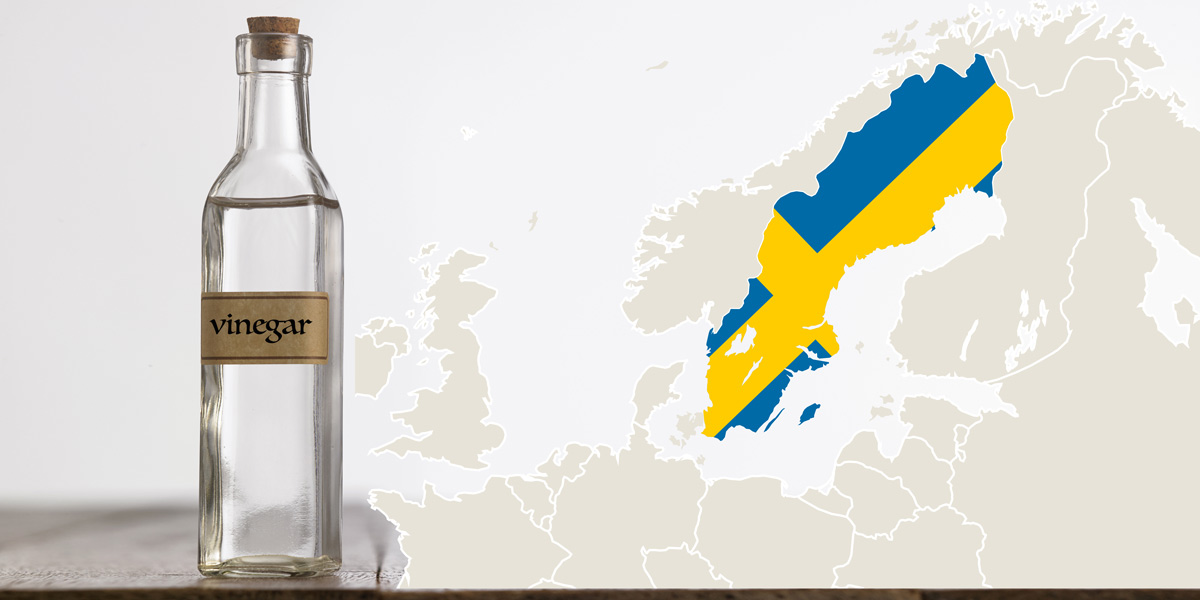
Sweden is moving to stop private individuals using acetic acid (an ingredient of vinegar) for killing weeds, as well as targeting more obviously risky herbicides like glyphosate. Claire Robinson asks if its action against acetic acid is equivalent to taking a sledgehammer to crack a nut
The Swedish Chemicals Agency is planning to tighten the rules on the private use of pesticides in Sweden. Glyphosate is included in the list of substances that will likely be banned.
According to a new report to the Swedish Government, it will only be possible for private users to use products containing low-risk substances. According to the Swedish authorities’ preliminary assessment, glyphosate is “not expected to be included among the low-risk substances”.
This means that in a few years’ time products containing glyphosate may not be authorized for private use.
“The planned regulations for the private use of plant protection products aim to improve protection of health and the environment. They will also contribute to a toxic-free everyday life and a non-toxic environment,” says Peter Bergkvist, principal policy advisor at the Swedish Chemicals Agency (known as Kemi).
Acetic acid in line for ban
Some may be surprised that among the substances slated by Sweden for a private use ban is acetic acid, an ingredient of vinegar. Acetic acid preparations and vinegar are used by farmers and home gardeners as an alternative to herbicides like the glyphosate-based Roundup.
Recently GMWatch reported that Scotts is marketing a “glyphosate-free” Roundup, which has acetic acid as its active ingredient.
There’s a general perception that acetic acid preparations and vinegar are safe to use as herbicides. So GMWatch asked Peter Bergkvist why acetic acid was tabled for a ban. In an email, Mr Bergkvist replied that this was “due to the hazard properties of the substance and the fact that it has been classified as a skin corrosive in category 1A in its pure form”.
It’s right and proper that the public should be protected against corrosive substances. But ordinary household vinegar only contains about 5% acetic acid. The Scotts product contains just 6% acetic acid. Only at levels above 10% does acetic acid present a danger of skin burns and eye injury. So unless the adjuvants in the Scotts product significantly increase the corrosive nature of the acetic acid, it doesn’t seem to be a risky product.
The Scotts product carries a warning label advising people to avoid getting it into their eyes or on their skin. It makes sense to use eye goggles and gloves while applying this and similar products. If further protection is needed, plastic coveralls can be used.
But it seems excessive for Sweden to ban vinegar- and acetic acid-based herbicide products for private use on the basis of the corrosive nature of the active ingredient at a much higher concentration than users would be exposed to.[1]
At this point, defenders of Roundup are likely to respond, “See, it’s the dose that makes the poison. You’re claiming that the doses of acetic acid people will be exposed to are safe, and similarly, we say that the doses of Roundup that people are exposed to are safe.”
But there’s a crucial difference. While you wouldn’t want to get vinegar in your eyes, it has a long history of safe use in the kitchen and in the garden. And it has never been suspected of causing long-term toxicity, such as cancer or serious organ damage.
In contrast, glyphosate and Roundup have been shown in studies to impact reproductive health, to damage DNA, and to damage the liver and kidneys. Glyphosate has been classified by the World Health Organisation’s cancer agency IARC as a probable carcinogen.
There’s also a possibility that glyphosate herbicide formulations may be endocrine (hormone) disruptors. In that case, there would be no safe dose, as these substances can exercise their effects at extremely low concentrations. These low doses of glyphosate herbicides – the very doses we are exposed to – have never been tested for safety for regulatory purposes.
In sum, the Swedish move against acetic acid seems somewhat equivalent to taking a sledgehammer to crack a nut.
Background
In September 2016 the Government of Sweden mandated the Swedish Chemicals Agency to analyze the need and potential to restrict the private use of pesticides. Today the Swedish Chemicals Agency submitted its report to the Government.
The regulations that the Swedish Chemicals Agency aims to implement are intended to ensure that only pesticides with less harmful properties will be authorized for private use, with no requirement for education. It is expected that the regulations will be applied from 2019.
Who decides which pesticides will be allowed to be sold to private users? The Swedish Chemicals Agency says that will be determined by the European Commission’s assessment of which substances qualify as “low risk”. Glyphosate and acetic acid are not expected to make the grade.
According to the Agency, “Most glyphosate products in Sweden are currently only permitted for professional use with special knowledge requirements, although some products are also approved for private use.”
The Swedish Chemicals Agency decided in autumn 2016 to tighten the rules on which plant protection products may be used by non-professionals (private users). Other EU Member States, including France and Denmark, have also decided on national restrictions on the private use of plant protection products.
“EU Member States are obliged to set targets and introduce national regulations for reducing the risks of plant protection product use. This applies in particular to private use. The new rules that we wish to introduce are regulations in line with these requirements, and they will take effect in Sweden in a few years,” says Peter Bergkvist.
Notes
1. In the US, the use of a vinegar product for killing weeds, unless it is specifically labelled as a herbicide, is illegal and a violation of federal pesticide laws.